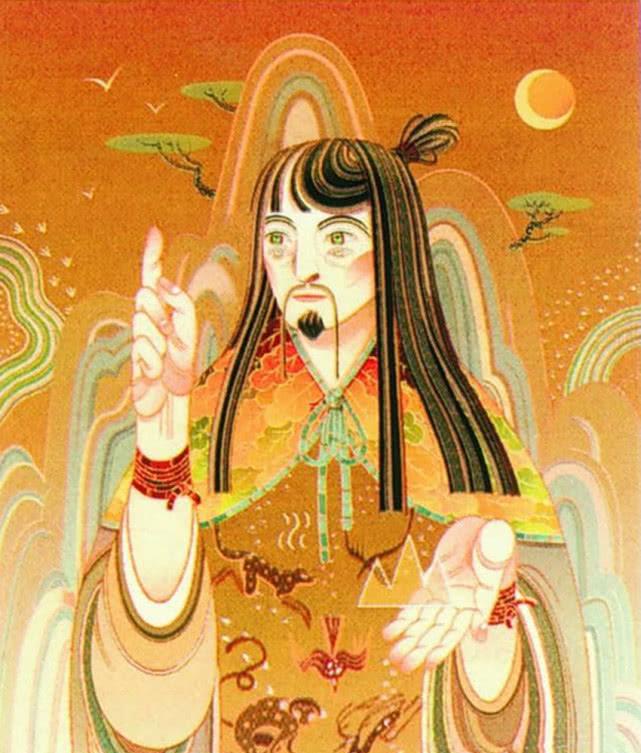The Huainan Zi Benjing records: "In the past, Cangjie wrote books, but the rain fell on the day, and the ghosts cried at night." ”
Cangjie is also a coined word, what does it have to do with "ghost"? What do "ghosts" cry about?
To understand this, we have to understand what the "ghost" here refers to. After understanding what the "ghost" here refers to, the meaning of this sentence said in "Huainanzi" will be understood.

(Cangjie on stamps)
In ancient times, some natural phenomena such as "wind, rain, thunder and lightning" often showed places that people did not understand. In ancient times, not only did it not understand, but also because of some natural phenomena such as wind, rain, thunder and lightning, it was often very destructive to human beings. Crops will be blown down by strong winds, thunder will chop people to death in the wild, and so on. These natural phenomena often made the ancients feel extremely frightened.
In addition to many natural phenomena that people do not understand, such things as "birth, old age, illness and death" are also not understood by human beings.
Where do people come from? Why did it inexplicably come out of my mother's belly? Why do people get sick? What causes people to get sick? People live well, why do they get old? Why not always young and strong? Why do people die again? After being buried in the ground after death, where did it go? All of this, the ancients are very incomprehensible.
In addition, human beings are also full of doubts about the environment in which they live.
Qu Yuan asked more than a hundred questions in "Heavenly Questions". In Qu Yuan's time, not only did there have been words for a long time, but also mankind's understanding of the world has made great progress. However, he is still full of doubts about the world.
It is no wonder that Qu Yuan, even in the next one or two thousand years, the ancient Chinese still believed that the surface of the area where they lived was flat, surrounded by four seas. "The sky is like a vault, and the cage covers the four fields" has always been such an understanding.
(Network illustration)
It can be seen how limited the ancients' understanding of the world was before there was writing.
It is precisely because of the limited understanding of various phenomena that are not understood, the ancients were afraid of many things. And what is feared is the "ghost."
That is to say, the ancients believed that the reason why there were so many disasters and the reason why there were so many incomprehensions was that the "ghost gods" were at work, and it was the "ghost gods" who manipulated the world.
In the eyes of the ancients, there was a difference between "ghosts" and "gods", "gods" who lived in heaven, were "masculine", and often helped human beings. "Ghosts" live underground, are "feminine," and often bring disaster to humanity.
Before the advent of writing, human knowledge could only come from word of mouth. Grandpa passed on to dad, dad to son, son to grandson, so passed on from generation to generation.
Although there was already a "knotted rope chronicle" at that time, in fact, the knot on the rope could at most indicate what disasters occurred to the tribe in which years and at what time. This rope, more than just a concept of time. Moreover, because the ancients did not have a scale, the record of time was not very accurate. Even the record of time is not accurate, and the knot on the rope, the record of events, is even more inaccurate.
(Knotted Rope Chronicle)
Therefore, the "knotted rope chronicle" is actually useless, and the transmission of knowledge can only rely on word of mouth.
However, this kind of word of mouth is very limited. One is inaccurate, the second is to forget, and the third is not to understand. Perhaps the ancients have accumulated certain experience in the things they do not understand around them, or their understanding of "ghosts and gods". But due to the above three reasons, it eventually returned to ignorance and a greater fear of "ghosts".
However, when human beings appeared in writing, the situation was different. The achievements of civilization accumulated by mankind will be recorded. Human beings' thinking about the world and understanding of "ghosts and gods" are no longer "self-made" and no longer "from scratch", but can be based on the existing experience of their ancestors and then dig deeper and explore. This is what Newton called "standing on the shoulders of giants."
When human beings understand those natural phenomena, they are no longer afraid of those things. No longer afraid of those things, how could the "ghost" not cry?
In addition to saying "ghosts cry at night", "Huainanzi" also says "heavenly rain millet", which means that grain will fall from the sky. This sentence, as it is meant to indicate, is also the importance of written records. Written records can not only enable human beings to explore more unknown areas, but also record the production experience of human beings and pass on these production experiences to future generations. In this way, human production capacity is naturally getting stronger and stronger. This is equivalent to the fact that God will give more food to the world. That's why it's called "rainy days.".
In short, this statement in "Huainanzi" is to affirm the great role played by words in promoting human civilization.
(Reference: Huainanzi, etc.)